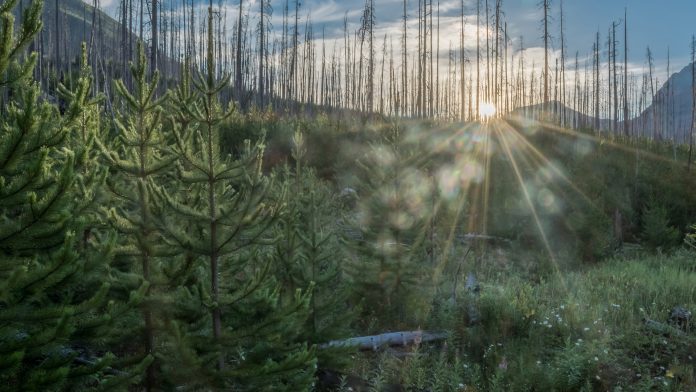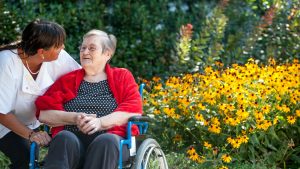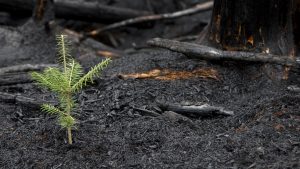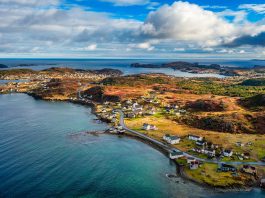Research propels innovation and discovery at Thompson Rivers University (TRU). Located in the picturesque city of Kamloops, British Columbia, Canada, TRU is pioneering research to address critical global and local issues.
With a commitment to collaborative, impactful research, TRU is dedicated to creating solutions that matter. Through initiatives that span population health, cultural preservation, and environmental resilience, TRU’s research centres are making meaningful strides towards a better future.
This commitment is most clearly exemplified by three of TRU’s research centres: the Population Health and Aging Rural Research Centre (PHARR), the All My Relations Research Centre, and the Institute for Wildfire Science, Adaptation and Resiliency. Each of these centres reflects the university’s values and brings together faculty, students, and community partners to drive progress on issues affecting Canadians and beyond.
“At TRU, our researchers, faculty, students, and community partners work together to push the boundaries of knowledge and create solutions to the pressing challenges we face,” says Shannon Wagner, Vice-President Research at TRU. “By fostering partnerships and collaboration, we are not only addressing today’s societal needs but are also preparing for the future.”
The All My Relations Research Centre: Empowering Indigenous wellbeing
As a leader in Indigenous research, TRU hosts one of the largest Indigenous student populations in British Columbia and reflects its commitment to bettering Indigenous health and wellbeing through the All My Relations Research Centre.
The All My Relations Research Centre at TRU acts as a national Indigenous family and community health research and training centre, designed to identify, research, further develop, and implement best practices in Indigenous family and community health and healing. This centre prioritises research that is both culturally relevant and community-driven, working closely with Indigenous groups to address their priorities and promote Indigenous health and wellness.
The Centre also guides the Knowledge Makers Undergraduate Circle, a programme launched in 2016 that has guided nearly 100 Indigenous students in publishing their first peer-reviewed articles. These students share their perspectives in the Knowledge Makers Journal, enriching the academic landscape with Indigenous knowledge and insight.
In a recent collaboration with the Food and Agriculture Organization (FAO) of the United Nations, the All My Relations Research Centre brought to life a pivotal international Indigenous Women’s research cohort. Celebrated at TRU’s IDays 2024, this unique gathering marked the culmination of a multi-year initiative involving Indigenous Women scholars from 16 countries, focused on pressing global issues related to Indigenous Women, Indigenous knowledge and food systems, as well as climate action.
This cohort’s work, soon to be published in the Special Edition Knowledge Makers Journal, showcases original research that brings Indigenous perspectives to the forefront of climate resilience and food security dialogues. Co-led by TRU faculty Dr Rod McCormick, Director of the All My Relations Research Centre, this collaboration not only amplifies Indigenous voices but reinforces TRU’s mission to foster equity and sustain Indigenous knowledge in global policy discussions.

“This collaboration underscores the power of Indigenous knowledge in addressing global challenges, with the cohort of Indigenous Women scholars bringing invaluable insights into food systems, climate resilience, and cultural preservation—knowledge that is not only grounded in heritage but also crucial for sustainable futures,” says Dr Rod McCormick, Director of the All My Relations Research Centre. “At TRU, we are committed to elevating Indigenous voices and supporting research that drives meaningful, community-centred change.”
For many Indigenous communities, this research is essential for reclaiming heritage, protecting traditions, and nurturing a vibrant and prosperous future.
Transforming rural health with the Population Health and Aging Rural Research Centre
Launched in June 2024, TRU’s Population Health and Aging Rural Research Centre (PHARR) focuses on improving healthcare outcomes in rural and ageing communities. With an ageing population in Canada, particularly in rural regions, there is an urgent need to address the unique healthcare challenges these communities face. PHARR’s mission is to understand and tackle these challenges by working directly with people with lived experience, community leaders, and policymakers.
Dr Juanita-Dawne Bacsu, Canada Research Chair in Nursing and Population Health and Assistant Professor at Thompson Rivers University, leads research at PHARR to improve dementia care and health equity of older adults in rural areas, with a focus on reducing stigma, promoting cognitive health, and using a social determinants of health approach to address the unique challenges in rural communities.
By conducting in-depth community-based studies, PHARR’s research team works in partnership with rural communities to develop evidence-based strategies to improve the health equity of rural older adults. This work not only helps local residents lead healthier lives but also informs policy, programmes, and practice, ensuring that the unique needs of rural Canadians are recognised. Through partnerships at the individual, community, and policy levels, PHARR is translating its findings into real-world solutions that make a measurable difference.
Advancing wildfire resilience at the Institute for Wildfire Science, Adaptation and Resiliency
As climate change intensifies globally, so do the risks and impacts of wildfires. TRU’s Institute for Wildfire Science, Adaptation and Resiliency was established to address these challenges by researching and developing strategies for wildfire prevention, adaptation, and community resilience. In partnership with the BC Wildfire Service, the Institute collaborates with community members, firefighters, and industry leaders to pioneer innovative solutions that enhance safety and environmental sustainability.
A key project underway at the Institute, led by Dr Lauchlan Fraser, core researcher at TRU’s Institute for Wildfire Science, Adaptation and Resiliency and NSERC Industrial Research Chair in ecosystem reclamation, focuses on revolutionising post-wildfire ecosystem reclamation through innovative drone-deployed seedpods. The initiative is currently developing methods to rapidly restore forests and vegetation in remote and fire-damaged regions. Partnering with Tree Track Intelligence, his team is using drone technology to distribute specially designed seedpods, targeting areas that are otherwise too dangerous or inaccessible for traditional replanting methods.
“At the Institute for Wildfire Science, Adaptation and Resiliency, we’re rethinking how we approach ecosystem recovery,” says Dr Fraser. “Drones allow us to safely reach remote sites following a wildfire, delivering custom seedpods that are optimised for quick germination. This technology provides an opportunity to reclaim large areas faster and more effectively, creating stronger ecosystems that can withstand future challenges.”

The seedpods used are designed to meet the specific needs of each environment, containing native species that are essential for ecosystem balance, and which hold cultural significance to Indigenous communities. The project is further testing methods to increase germination rates, reduce growth time, and boost the survival of newly planted vegetation—laying the groundwork for a faster, more sustainable approach to wildfire recovery across BC.
By integrating academic research with real-world applications, the Institute for Wildfire Science, Adaptation and Resiliency is paving the way for a future that is not only more resilient but also adaptable to the increasing threats of wildfires while empowering communities with the tools they need to face the increasing wildfire threat.
Collaboration for real-world impact at TRU’s research centres
TRU’s research extends beyond its campus through strategic collaboration with government agencies, Indigenous organisations, peer institutions, and local community partners. These collaborations allow the university to bring its research directly into communities, ensuring that discoveries and advancements are easily accessible and create meaningful impact. By building strong relationships with local and global partners, TRU ensures that its research contributes to tangible improvements in policy, community wellbeing, and environmental health.
At Thompson Rivers University, research acts as a powerful catalyst for change. By advancing knowledge across various disciplines, TRU addresses local challenges and contributes to global progress. Thompson Rivers University is proud to lead research that fosters collaboration, drives advancements, and meets the challenges of today and tomorrow.
To learn more about Thompson Rivers University’s research centres, visit tru.ca/research
Please note, this article will also appear in the 20th edition of our quarterly publication.







